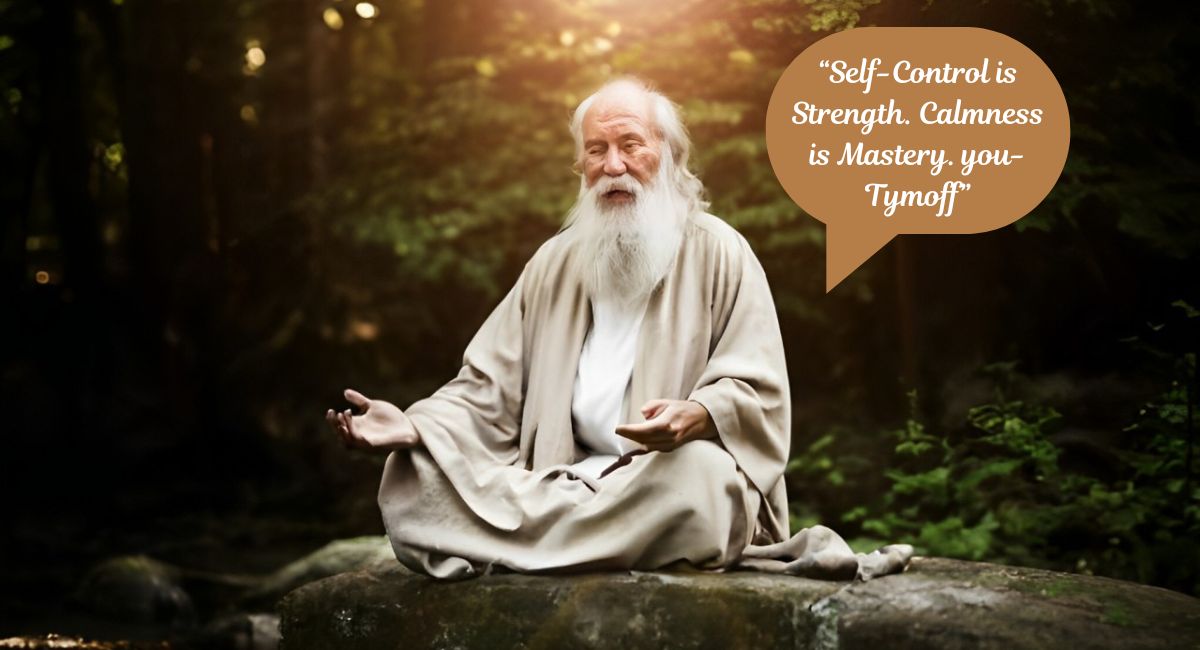Introduction
In a world marked by constant change, stress, and challenges, the ability to maintain self-control and calmness is crucial for personal growth and success. The quote “Self-control is strength. Calmness is mastery. You” by Tymoff encapsulates a profound philosophy about personal power and mastery. This article delves into the meaning behind this quote, exploring the concepts of self-control and calmness, and how they contribute to achieving mastery in one’s life.
Section 1: The Essence of Self-Control
- Defining Self-Control
- What is Self-Control?: Self-control refers to the ability to regulate one’s emotions, behaviors, and desires in the face of external demands. It involves resisting temptations, managing impulses, and making deliberate choices aligned with long-term goals.
- Importance of Self-Control: Self-control is essential for achieving personal and professional success. It enables individuals to make thoughtful decisions, stay focused on their objectives, and overcome obstacles.
- Self-Control as Strength
- Inner Strength: Self-control is often described as a form of inner strength. It requires discipline and determination to maintain composure and adhere to one’s values and goals despite challenges.
- Building Resilience: Developing self-control builds resilience, allowing individuals to handle stress and adversity more effectively. It contributes to mental and emotional stability, fostering a sense of empowerment and confidence.
- Strategies for Enhancing Self-Control
- Goal Setting: Setting clear and achievable goals helps individuals maintain focus and resist distractions. Establishing short-term and long-term objectives provides a sense of direction and purpose.
- Mindfulness and Reflection: Practicing mindfulness and self-reflection enhances self-awareness and helps individuals recognize and manage their impulses. Techniques such as meditation and journaling can improve self-control.
Section 2: The Role of Calmness in Mastery
- Understanding Calmness
- Definition of Calmness: Calmness refers to a state of tranquility and composure, even in the midst of stress or chaos. It involves maintaining a clear and steady mind, free from excessive anxiety or agitation.
- Benefits of Calmness: Calmness promotes better decision-making, reduces stress, and enhances overall well-being. It enables individuals to approach challenges with a balanced perspective and make rational choices.
- Calmness as Mastery
- Mastery Through Calmness: Calmness is seen as a form of mastery because it allows individuals to remain composed and effective in various situations. It reflects a high level of control over one’s emotions and responses.
- Achieving Mastery: Mastery involves a deep understanding and control of a particular skill or aspect of life. Calmness contributes to this mastery by providing the mental clarity needed to navigate complex situations and make informed decisions.
- Cultivating Calmness
- Stress Management Techniques: Techniques such as deep breathing exercises, progressive muscle relaxation, and mindfulness can help individuals manage stress and maintain calmness.
- Balanced Lifestyle: Maintaining a balanced lifestyle, including regular physical exercise, healthy eating, and adequate sleep, supports emotional stability and promotes calmness.
Section 3: Integrating Self-Control and Calmness for Personal Mastery
- The Connection Between Self-Control and Calmness
- Complementary Traits: Self-control and calmness are complementary traits that work together to enhance personal mastery. While self-control helps regulate behavior and emotions, calmness ensures a steady and focused approach to challenges.
- Synergistic Effects: The integration of self-control and calmness leads to greater overall effectiveness and success. Individuals who cultivate both traits are better equipped to handle stress, make strategic decisions, and achieve their goals.
- Practical Applications
- Professional Success: In a professional setting, self-control and calmness contribute to effective leadership, problem-solving, and conflict resolution. Leaders who demonstrate these qualities inspire confidence and foster a positive work environment.
- Personal Growth: On a personal level, self-control and calmness support healthy relationships, emotional well-being, and personal development. They enable individuals to navigate life’s challenges with grace and resilience.
- Real-Life Examples
- Successful Individuals: Many successful individuals exemplify self-control and calmness in their achievements. For example, athletes, executives, and artists often demonstrate these traits in their pursuit of excellence.
- Historical Figures: Historical figures such as Nelson Mandela and Mahatma Gandhi are known for their ability to maintain composure and self-control in the face of adversity, contributing to their impactful leadership and legacy.
Section 4: The Role of Self-Reflection and Personal Growth
- Self-Reflection as a Tool for Growth
- Importance of Self-Reflection: Self-reflection involves examining one’s thoughts, feelings, and actions to gain insights and understanding. It is a crucial tool for personal growth and development.
- Applying Insights: By reflecting on their experiences, individuals can identify areas for improvement, set new goals, and develop strategies for enhancing self-control and calmness.
- Continuous Improvement
- Commitment to Growth: Personal mastery is a continuous journey that requires ongoing effort and commitment. Embracing a mindset of continuous improvement helps individuals adapt to new challenges and refine their skills.
- Learning and Development: Engaging in learning opportunities, such as workshops, courses, and mentorship, supports personal development and enhances self-control and calmness.
Section 5: Overcoming Challenges and Maintaining Balance
- Addressing Common Challenges
- Managing Impulses: Overcoming impulsive behavior requires awareness and practice. Techniques such as pausing before reacting and considering the long-term consequences of actions can help manage impulses.
- Handling Stress: Stress management strategies, including relaxation techniques and time management, are essential for maintaining calmness and preventing burnout.
- Maintaining Balance
- Work-Life Balance: Striving for a balance between professional and personal responsibilities supports overall well-being and helps maintain self-control and calmness.
- Self-Care Practices: Prioritizing self-care, including physical exercise, hobbies, and social connections, contributes to emotional stability and resilience.
What Sets PedroVazPaulo Apart?
PedroVazPaulo isn’t just another executive coach. His approach is as unique as the leaders he works with. Here’s what makes his coaching style special:
- Tailored Development Plans: No two leaders are the same, and PedroVazPaulo knows it. He crafts personalized plans that address your specific goals and challenges.
- Continuous Feedback Loop: Progress isn’t left to chance. Regular assessments and feedback ensure you’re always moving in the right direction.
- Mindset Transformation: It’s not just about skills; it’s about shifting your entire approach to leadership.
- Emotional Intelligence Focus: Research shows that EQ is crucial for effective leadership. PedroVazPaulo places a strong emphasis on developing this vital skill.
- Strategic Execution: Learn how to turn plans into action and hold yourself accountable for results.
The PedroVazPaulo Method in Action
Imagine having a personal guide through the maze of leadership challenges. That’s what PedroVazPaulo offers. His coaching isn’t about giving you a manual; it’s about engaging in meaningful dialogue that uncovers your potential.
Here’s how a typical coaching journey might unfold:
- Initial Deep Dive: You’ll start with a comprehensive assessment of your current skills, goals, and challenges.
- Custom Action Plan: Based on this assessment, PedroVazPaulo crafts a tailored roadmap for your development.
- Regular One-on-One Sessions: These aren’t just check-ins; they’re transformative conversations that push you to grow.
- Real-World Application: You’ll apply what you learn immediately in your workplace, with guidance on how to navigate real challenges.
- Ongoing Evaluation: Your progress is continually monitored and your plan adjusted as needed.
The Impact on Your Organization
When you grow as a leader, your entire organization benefits. Here’s how PedroVazPaulo’s coaching can transform your company:
- Enhanced Team Performance: Learn how to motivate and inspire your team to achieve more.
- Increased Innovation: Develop the skills to foster creativity and out-of-the-box thinking.
- Better Change Management: Navigate organizational changes with confidence and clarity.
- Improved Employee Engagement: Create a work environment where people are excited to contribute.
- Stronger Organizational Culture: Build a culture of continuous learning and accountability.
Real Success Stories
Don’t just take our word for it. Here’s what some leaders have to say about their experience with PedroVazPaulo:
“The feedback and unique coaching I received were key in transforming my approach to leadership. The action plans and one-to-one sessions helped me tackle tough business situations with confidence.” – Sarah J., CEO
“PedroVazPaulo’s coaching provided me with invaluable insights and strategies for dealing with complex business challenges. The ongoing support has been a game-changer for my professional growth.” – Michael T., CFO
Ready to Transform Your Leadership?
If you’re ready to take your leadership skills to the next level, PedroVazPaulo Executive Coaching might be just what you need. Here’s how to get started:
- Schedule an Initial Consultation: Get a feel for PedroVazPaulo’s approach and see if it’s the right fit for you.
- Develop Your Custom Plan: Work with PedroVazPaulo to create a coaching plan tailored to your needs.
- Commit to the Process: Engage fully in the coaching journey, applying what you learn in real-time.
Conclusion
The quote “Self-control is strength. Calmness is mastery. You” by Tymoff encapsulates a powerful philosophy about personal empowerment and mastery. By emphasizing the importance of self-control and calmness, Tymoff highlights the essential traits needed to achieve personal and professional success. Cultivating self-control and calmness not only enhances individual effectiveness but also contributes to overall well-being and resilience.

